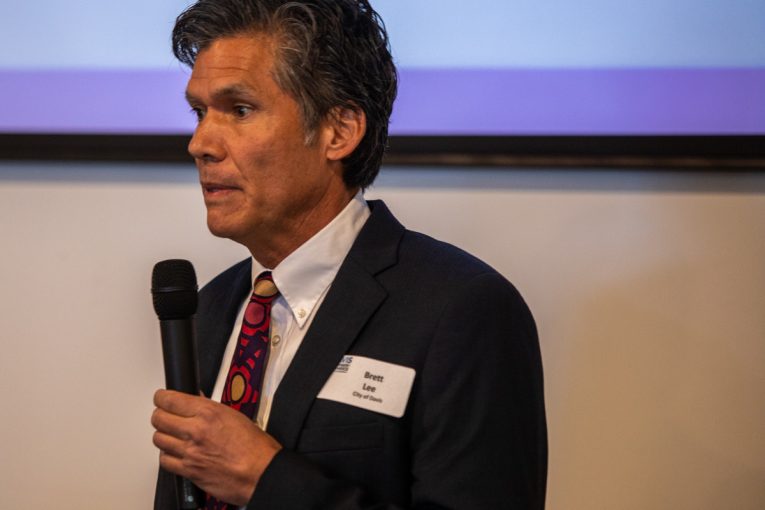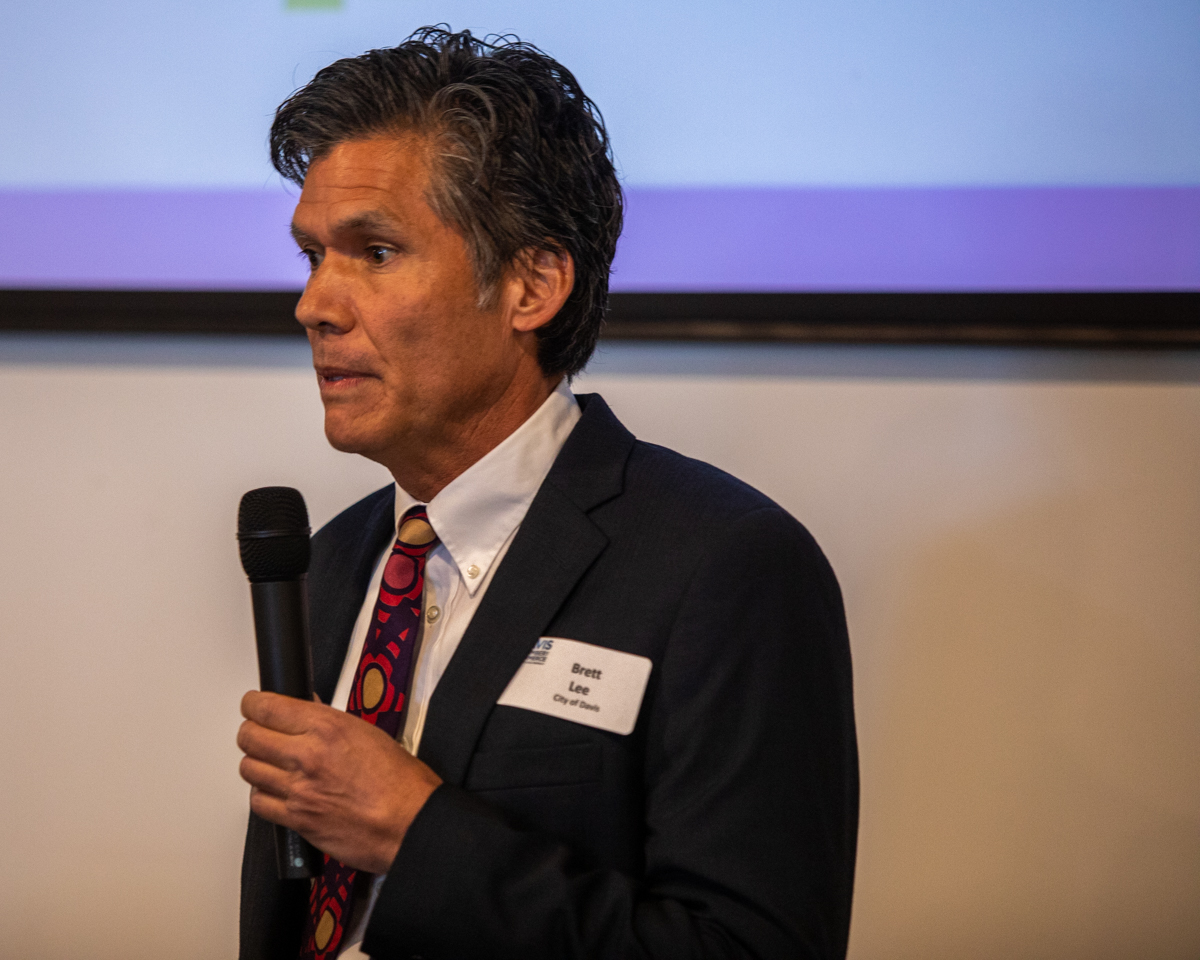

We can debate over whether the city is headed in the right or wrong direction, I suppose. The mayor presented what I would consider an overly rosy view of the city. He did offer the caveat that “it’s not all sunshine and rainbows” to describe the state of the city but, while correctly identifying roads as a concern, he also hit on the recent string of “armed crimes in Davis” as reason for concern.
An address of this sort is tricky. On the one hand, you have an audience that you often don’t get at council meetings, that are unfamiliar with many of the issues and so you want to lay out your accomplishments – especially in an election year. On the other hand, you have an opportunity to issue forth a call to action – and here it seems the mayor fell a bit short.
No more did that appear to be the case than on the issue of economic development. There is good news, to be sure. We have hotels opening next month – the Residence Inn. Hyatt House is in construction. We have seen cannabis produce more revenue than expected.
We have won some victories with places like Nugget and Mars, and the city manager announced a new R&D related announcement in the next few weeks.
But what we learned in the past year is that the city really lacks available commercial property. The number of parcels over seven acres is extremely limited. And the Aggie Research Campus proposal is coming in November – but it is looking like it will be a dogfight.
This was an opportunity for the city to make the case for economic development as a means to manage the budget – and the mayor didn’t try to make this case at all. Given the audience that seems  like a big loss.
like a big loss.
As some commenters have pointed out, despite efforts by the city to cut into the roads and other deficits, despite added revenue, the shortfall – instead of dropping over the last few years – has actually increased.
The city has embarked on the downtown plan.
City Manager Mike Webb said, “We have a number of projects that are underway that begin to address that in a more proactive fashion.” The biggest of those is the downtown plan – a comprehensive revamp of the downtown plan which looks to put housing the downtown “and activate the downtown on a 24/7 basis.”
He noted a goal is a “mix of unit types” where there is not a homogeneous single-family home development.
“The downtown plan effort – it’s a very substantial undertaking to do a revamp of our entire downtown plan,” he said. “It’s been making very good progress.”
But the city manager here, along with the mayor, focused on the positive.
One of the keys to the downtown plan effort is “economic development” as well as “business recruitment, retention.”
One of the barriers to entry is the “morass that one has to go through in order to navigate the rules and regulations.” He noted that right now there are no less than seven documents that one needs to navigate and try to comply with. “The downtown plan effort that we’re doing – the big thrust of it is to try to consolidate it.”
He explained, “By going to a form-based code approach,” we are not focused “on the use so much as the form of the exterior of the building in terms of its mass and scale and how it fits into the downtown.”
The seven documents will be reduced down to one or at most two.
But missing here was a discussion of the challenges. The city of Davis, for instance, lags behind other communities in per capita retail sales. Clearly, one of the hopes of bringing residential and workforce housing to the downtown is to revitalize that.
But there was no discussion of the challenges for retail or why the city lags. There was no discussion on the fiscal analysis which shows that any type of large scale redevelopment will be challenging.
While the mayor and city manager talked about the new affordable housing that will be coming on-line, there was no discussion of the fiscal challenges to build more affordable housing, given the loss of R&D and the high costs of construction and land values.
Given all of the turmoil over parking in the last year, it is perhaps surprising that there wasn’t more discussion about downtown parking and the overall lack of real action by the city to address parking problems in the core.
More broadly, there was not really enough discussion to talk about challenges relating to traffic issues and the efforts underway on Mace.
The mayor did talk extensively about homelessness and the respite center, but the overall challenges involving homelessness remain. The fact is, while we have a rotating winter shelter, we lack year-round solutions for housing. We need to engage in a conversation on the need for permanent supportive housing – but of course at this time we lack those kind of resources.
It is kind of striking to compare efforts in Sacramento versus Davis just on the issues of homelessness, affordable housing and economic development.
Sacramento recently made news when it announced a plan to provide for $100 million to help finance affordable housing.
As the Bee reported last week: “The goal is to jump start housing for the city’s legions of service workers, college students, lower-income state workers and young coastal emigres, while turning the city into an incubator for new, fast and less expensive housing types that have not yet been produced on a broad scale.”
The reality is that the city of Davis has done a good job at providing more student housing – something desperately needed. But Davis is not only lacking workforce housing, it is lacking any sort of small “a” affordable housing that can provide places for younger families and professionals to move into.
Sacramento is looking into developing “dense micro-unit apartment complexes with no parking or modern versions of shared rooming houses, and possibly even units made out of metal shipping containers converted into modular apartments or ‘tiny homes’ built out of wood pallets.”
These are things that Davis is starting to look into and would have been grist for conversation with the business community.
The challenges of this community are tremendous – housing, infrastructure, economic development – and the city needs to build a partnership with the business community as well as with the broader community. This was a chance to engage that conversation – a chance that felt by the end of the presentation to be largely lost.
—David M. Greenwald reporting


“He noted a goal is a “mix of unit types” where there is not a homogeneous single-family home development.”
But Davis hasn’t done much in the production of single family homes in decades even if you include Cannery. Its a mystery that the single family housing, that defines much of the architecture of what is today is considered to be downtown, has been displaced or replaced by businesses or mixed use. As this has occurred over the last few decades not much has happened to replace it elsewhere in the city.
The sad part is that the failure to provide the preferred option of housing types, the single family home, for young families has resulted in the hollowing out of our schools as these young, well educated, employable, professional, tax paying, families, the kind of people that make up the bedrock of most communities, have moved to places like Woodland or Boise.
I suppose . . . WE’RE DOOMED
Actually Alan we are not doomed, we are in a Renaissance.
.
Funny you should refer to a period of time preceded, and overlapped with with the ‘flagellant’ thing… now seems like folk want to see ‘flagellence’ to avoid the “red (ink) death”… in the late middle ages, it was a phenomenon, bolstered by trying to ward off the “black death” (plague)…
Then, as now, thoughtful observation, analysis, thoughtful action will best combat “the disease”, rather than flagellation, and ‘mea culpas’… the plague (Black Death) was not caused by ‘sin’, ethnic groups poisoning wells, it was infected fleas carried by rats, and poor sanitation (inc. vermin control) practices.
The threats of “red (ink) death” may be analogous… opinion…
The ‘football’ will not be advanced by recriminations/fault-finding… observation, analysis, action, is needed.
BTW, hope all understand what ethnic group to which I refer… they were blamed for the black plague (many places), because , they had markedly less incidence of illness, and death… which was true… their incidence was much lower because of their cultural norms and practices. “Kosher” is not just a religious thing, it also makes a lot of sense as to health.
Observation, analysis, and rules probably had a lot to do with avoiding plague, trichinosis, etc.
“Funny you should refer to a period of time preceded, and overlapped with with the ‘flagellant’ thing… now seems like folk want to see ‘flagellence’ to avoid the “red (ink) death”… in the late middle ages, it was a phenomenon, bolstered by trying to ward off the “black death” (plague)…”
Flagellence would be preferable to the Mayor’s presentation that could be better described as campaign flatulence.
Like Voltaire’s Professor Pangloss in “Candide” seeing the city through the Mayor’s rose colored glasses would lead you to believe the city is the best it could possible be.
Quelle horreur!
I attended the State of the City on Wednesday. I was excited to do so. I remembered last years State of the City as a real analysis of the State of the City. With thoughtful discussion about budgets, forward planning and projections and more. That was not the case this year. I believe the presentation by both Mike Webb and Brett Lee was very well delivered. However, I agree with David Greenwald’s assessment about a missed opportunity. We, Davis, have some problems and the condition of our streets, which Brett brought up, is only scratching the surface. There is homelessness, a exodus of Davisites to other cities, a lack of affordability, an increase in crime, loss of downtown business. I attended The State of the City to gain some real insight into the “State of the City” and a discussion of the solutions being considered. I was disappointed as that just didn’t happen.
So, since here I’m under my 7 comment limit on this thread… and I support that policy… cuts down on “static”…
But also reminds me of Olympic bicycle races, in a velodrome… the “race” goes really slow, at first (lack of comments?) as the competitors size each other up, and look for ‘position’… then, someone “makes their move”, the other responds, but their is a limited # of laps in the ‘race’…
Not a criticism, but a prediction… of how frequent flyer posters will ‘adjust’… and that may very well be “good for the order”… see no downsides…
Velodrome races are cool to watch… boring @ first, but then intense…
But I say again, the admonitions, including, but not limited to, the 7 comment limit, posted by the Moderator are not inappropriate … I see them as ‘healthy, rational’ to appropriate discussion/learning/cogitation… others may differ, but that is my opinion… everyone is entitled to theirs, but I own my opinions, and no one should dare to tell me I should not hold them (opinions).
“Facts” are another matter… if I’m I’m factually wrong, my facts are fair game…